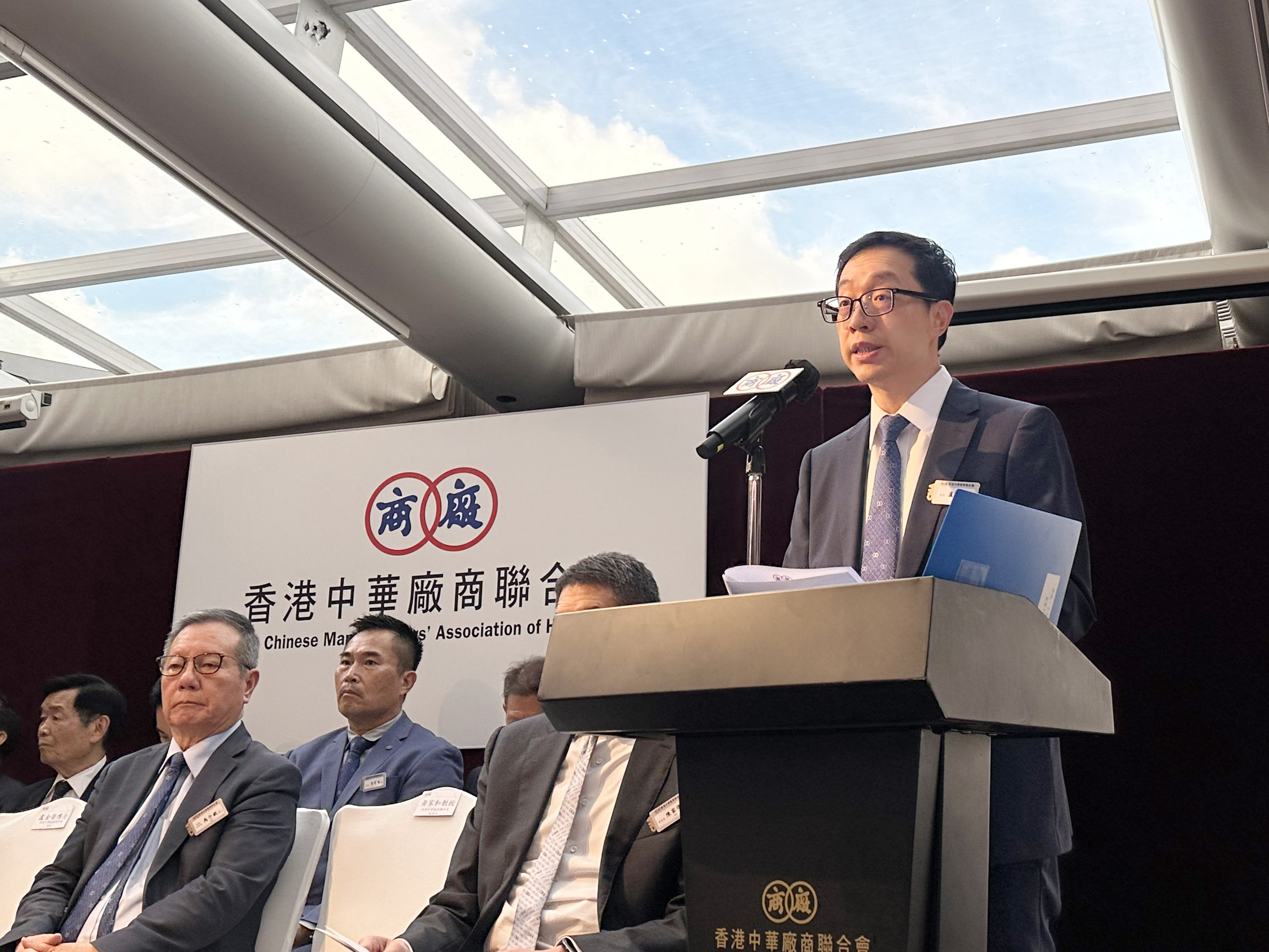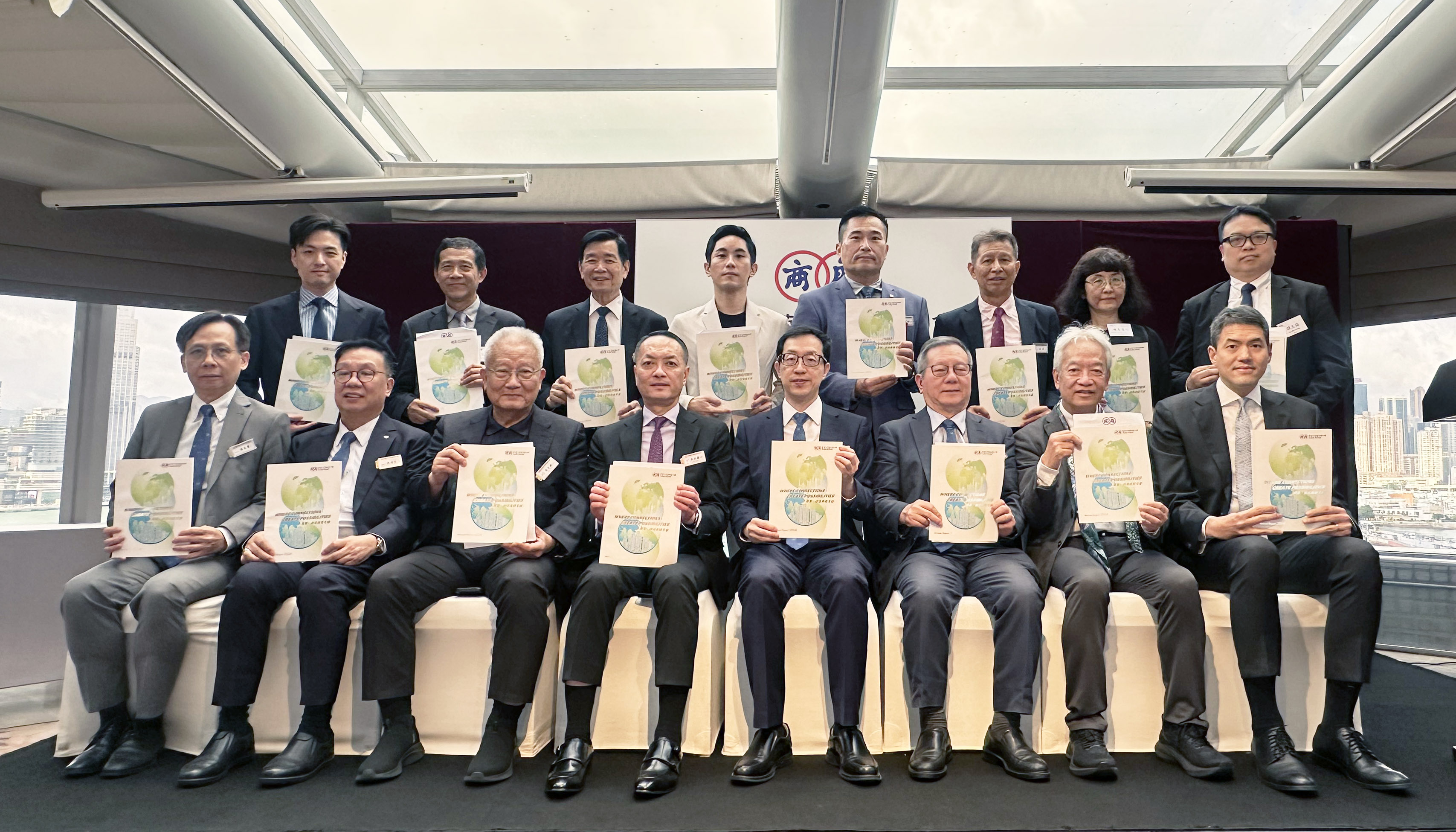CMA Annual General Meeting 2025:
Slight Economic Acceleration Predicted in 2026
The Chinese Manufacturers’ Association of Hong Kong (CMA) held its 2025 annual general meeting (AGM) today (25 September). President Dr Wingco Lo reviewed the association’s work over the past year, outlined upcoming work plan, and shared insights on the current economic and trade environment as well as future prospects.
Steady recovery amid uneven growth
The Hong Kong economy maintained a steady recovery in the first half of the year, achieving positive growth in both the first and second quarters. However, sequential recovery momentum moderated during the second quarter, revealing a pattern of imbalanced domestic and external demand alongside sectoral divergence. On the domestic front, private consumption expenditure registered a modest year-on-year increase of 1.9% in the second quarter, while investment expenditure saw only marginal growth of 2%, reflecting the impact of a subdued business environment and ongoing property market adjustments. These trends underscore continued weakness in domestic demand.
In contrast, external demand remained strong. The value of Hong Kong’s total exports of goods surged by 10% year-on-year in real terms in the first half of 2025, while services exports grew by 6.9%. Exports to the Mainland and ASEAN countries, in particular, rose by 16.1% and 24%, respectively, largely driven by Mainland enterprises’ front-loading of shipments and supply chain restructuring.
Improving domestic demand despite global slowdown
The international outlook for the second half of the year remains uncertain. Manufacturing PMI in major economies is sluggish, and the International Monetary Fund forecasts GDP growth in advanced economies at only 1.5% and 1.6% for this year and the next. Furthermore, uncertainty around US tariff policies and a decline in the “rush shipment” effect are impacting Hong Kong’s export prospects. Export trade growth is predicted to fall in the second half of the year, transitioning to low single-digit growth next year.
Domestically, a mix of positive and negative factors is shaping the market. While the retail and F&B sectors face challenges such as weak demand, changing tourist spending patterns, and the rapid rise of e-commerce, several positive factors are emerging. A recovery in the financial market and stabilisation in the property sector may create a positive wealth effect. The US Federal Reserve’s recent interest rate cuts will further lower borrowing costs. Together, these factors support both corporate investment and household spending.
Notably, the latest Policy Address introduced a series of strategic initiatives, including accelerating the Northern Metropolis development, encouraging industrial investment, and hosting mega events to revitalise tourism. These are expected to inject new momentum into domestic consumption and investment.
Given this backdrop, President Lo predicts, “Full-year GDP growth in 2025 will remain between 2.5% and 3%. With a gradual improvement in domestic demand, growth may pick up slightly to around 3% in 2026. Inflation pressures are expected to remain moderate, with consumer prices rising steadily at 2% to 2.5% annually over the next two years.”
CMA empowers transformation through innovation
In this complex and fast-evolving landscape, Hong Kong is navigating a critical period of economic structural adjustment. The CMA remains at the forefront of international collaboration, guiding the business community to leverage the national strategy of “bringing in” and “going global” to achieve industrial transformation and upgrading.
President Lo stated that the CMA is committed to fostering a Hong Kong model of high-quality productive forces for Hong Kong. By leveraging CMA Testing and its integrated service platform connecting industry, academia, research and investment, the CMA aims to facilitate the commercialisation of technological achievements and industrial upgrading. At the same time, through initiatives such as the “ESG Pledge,” “Hong Kong ESG Awards,” and halal certification services, the CMA assists enterprises in strengthening their international competitiveness.
Aligned with the national policy of high-level opening-up and the Hong Kong government’s vision to develop the city into a multinational supply chain management centre, the CMA has launched a “One-Stop Go Global Acceleration Programme.” This programme integrates a comprehensive suite of services, including expositions, testing and certification, technology commercialisation, business support, branding, ESG, and carbon audits, to help Mainland enterprises use Hong Kong as a springboard for global expansion.
As a vital link between the Mainland and the global community, the CMA facilitates international cooperation by regularly receiving visiting delegations and organising trade missions. Furthermore, the association is expanding high-level exchanges, including its Reception for the Consular Corps, to deepen multilateral partnerships.
CMA office-bearers attending the AGM also included Mr Jimmy Ng, Legislative Council Representative; Dr Warren Ma, Executive Vice President; Dr Dennis Ng, Permanent Honorary President; Professor Simon Wong, Mr Dennis Ng Kwok On, Mr Jackson Leung, Mr Calvin Chan, Mr Albert Chuang and Dr Ellis Wong, Vice Presidents; Dr Michael Chan and Dr Wong Chun, Honorary Presidents.
Encls: CMA’s Hong Kong Economic Outlook for 2026 (Chinese Only)

Dr Wingco Lo, President of the CMA, delivered a speech at CMA 2025 Annual General Meeting

Office-bearers of the CMA posed for a photo at 2025 Annual General Meeting
(Front row, from left)Mr Jackson Leung and Mr Dennis Ng Kwok On, Vice Presidents; Dr Dennis Ng, Permanent Honorary President; Mr Jimmy Ng, Legislative Council Representative; Dr Wingco Lo, President; Dr Warren Ma, Executive Vice President; Professor Simon Wong and Mr Calvin Chan, Vice Presidents
(Back row, third from the left)Dr Michael Chan, Honorary President; Mr Albert Chuang and Dr Ellis Wong, Vice Presidents; Dr Wong Chun, Honorary President
Steady recovery amid uneven growth
The Hong Kong economy maintained a steady recovery in the first half of the year, achieving positive growth in both the first and second quarters. However, sequential recovery momentum moderated during the second quarter, revealing a pattern of imbalanced domestic and external demand alongside sectoral divergence. On the domestic front, private consumption expenditure registered a modest year-on-year increase of 1.9% in the second quarter, while investment expenditure saw only marginal growth of 2%, reflecting the impact of a subdued business environment and ongoing property market adjustments. These trends underscore continued weakness in domestic demand.
In contrast, external demand remained strong. The value of Hong Kong’s total exports of goods surged by 10% year-on-year in real terms in the first half of 2025, while services exports grew by 6.9%. Exports to the Mainland and ASEAN countries, in particular, rose by 16.1% and 24%, respectively, largely driven by Mainland enterprises’ front-loading of shipments and supply chain restructuring.
Improving domestic demand despite global slowdown
The international outlook for the second half of the year remains uncertain. Manufacturing PMI in major economies is sluggish, and the International Monetary Fund forecasts GDP growth in advanced economies at only 1.5% and 1.6% for this year and the next. Furthermore, uncertainty around US tariff policies and a decline in the “rush shipment” effect are impacting Hong Kong’s export prospects. Export trade growth is predicted to fall in the second half of the year, transitioning to low single-digit growth next year.
Domestically, a mix of positive and negative factors is shaping the market. While the retail and F&B sectors face challenges such as weak demand, changing tourist spending patterns, and the rapid rise of e-commerce, several positive factors are emerging. A recovery in the financial market and stabilisation in the property sector may create a positive wealth effect. The US Federal Reserve’s recent interest rate cuts will further lower borrowing costs. Together, these factors support both corporate investment and household spending.
Notably, the latest Policy Address introduced a series of strategic initiatives, including accelerating the Northern Metropolis development, encouraging industrial investment, and hosting mega events to revitalise tourism. These are expected to inject new momentum into domestic consumption and investment.
Given this backdrop, President Lo predicts, “Full-year GDP growth in 2025 will remain between 2.5% and 3%. With a gradual improvement in domestic demand, growth may pick up slightly to around 3% in 2026. Inflation pressures are expected to remain moderate, with consumer prices rising steadily at 2% to 2.5% annually over the next two years.”
CMA empowers transformation through innovation
In this complex and fast-evolving landscape, Hong Kong is navigating a critical period of economic structural adjustment. The CMA remains at the forefront of international collaboration, guiding the business community to leverage the national strategy of “bringing in” and “going global” to achieve industrial transformation and upgrading.
President Lo stated that the CMA is committed to fostering a Hong Kong model of high-quality productive forces for Hong Kong. By leveraging CMA Testing and its integrated service platform connecting industry, academia, research and investment, the CMA aims to facilitate the commercialisation of technological achievements and industrial upgrading. At the same time, through initiatives such as the “ESG Pledge,” “Hong Kong ESG Awards,” and halal certification services, the CMA assists enterprises in strengthening their international competitiveness.
Aligned with the national policy of high-level opening-up and the Hong Kong government’s vision to develop the city into a multinational supply chain management centre, the CMA has launched a “One-Stop Go Global Acceleration Programme.” This programme integrates a comprehensive suite of services, including expositions, testing and certification, technology commercialisation, business support, branding, ESG, and carbon audits, to help Mainland enterprises use Hong Kong as a springboard for global expansion.
As a vital link between the Mainland and the global community, the CMA facilitates international cooperation by regularly receiving visiting delegations and organising trade missions. Furthermore, the association is expanding high-level exchanges, including its Reception for the Consular Corps, to deepen multilateral partnerships.
CMA office-bearers attending the AGM also included Mr Jimmy Ng, Legislative Council Representative; Dr Warren Ma, Executive Vice President; Dr Dennis Ng, Permanent Honorary President; Professor Simon Wong, Mr Dennis Ng Kwok On, Mr Jackson Leung, Mr Calvin Chan, Mr Albert Chuang and Dr Ellis Wong, Vice Presidents; Dr Michael Chan and Dr Wong Chun, Honorary Presidents.
Encls: CMA’s Hong Kong Economic Outlook for 2026 (Chinese Only)

Dr Wingco Lo, President of the CMA, delivered a speech at CMA 2025 Annual General Meeting

Office-bearers of the CMA posed for a photo at 2025 Annual General Meeting
(Front row, from left)Mr Jackson Leung and Mr Dennis Ng Kwok On, Vice Presidents; Dr Dennis Ng, Permanent Honorary President; Mr Jimmy Ng, Legislative Council Representative; Dr Wingco Lo, President; Dr Warren Ma, Executive Vice President; Professor Simon Wong and Mr Calvin Chan, Vice Presidents
(Back row, third from the left)Dr Michael Chan, Honorary President; Mr Albert Chuang and Dr Ellis Wong, Vice Presidents; Dr Wong Chun, Honorary President
